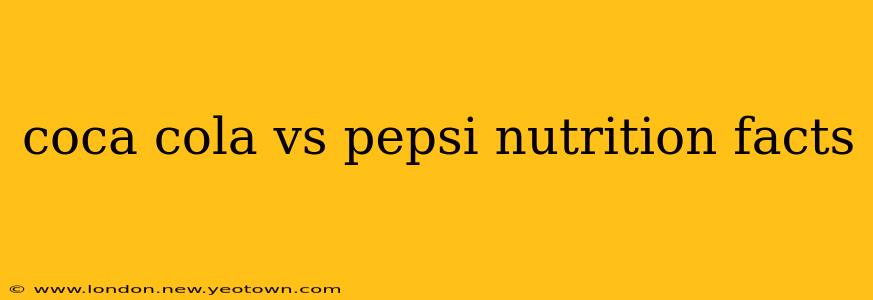The Great Cola Clash: A Deep Dive into Coca-Cola vs. Pepsi Nutrition
The age-old debate: Coca-Cola or Pepsi? For decades, these two titans have battled for dominance in the fizzy drink arena. But beyond the marketing campaigns and brand loyalty, what truly sets these two colas apart? Let's dive into a detailed comparison of their nutritional facts, exploring the subtle (and sometimes not-so-subtle) differences that might just sway your next soda choice.
This isn't just about sugar content; we'll explore the nuances of ingredients, potential health implications, and even the historical context that shaped these iconic beverages. Get ready to settle this cola conundrum once and for all!
Coca-Cola vs. Pepsi: A Side-by-Side Nutritional Comparison (per 12 oz serving)
It's important to note that these figures can vary slightly depending on the specific product and region. Always check the nutrition label on the can or bottle for the most accurate information. However, a general comparison reveals some key similarities and differences.
| Feature | Coca-Cola | Pepsi |
|---|---|---|
| Calories | ~140 | ~150 |
| Total Fat (g) | 0 | 0 |
| Saturated Fat (g) | 0 | 0 |
| Cholesterol (mg) | 0 | 0 |
| Sodium (mg) | ~45 | ~20 |
| Total Carbohydrate (g) | ~39 | ~41 |
| Sugars (g) | ~39 | ~41 |
| Protein (g) | 0 | 0 |
| Caffeine (mg) | ~34 | ~38 |
As you can see, the caloric content is quite similar, with Pepsi slightly edging out Coca-Cola. Both are essentially devoid of fat, cholesterol, and protein. The key differences lie in sodium and caffeine content, with Pepsi generally containing slightly more caffeine and less sodium. The sugar content is remarkably close.
What's in a Cola? A Look at the Ingredients
Both Coca-Cola and Pepsi rely on a similar base of ingredients: carbonated water, high fructose corn syrup (or sugar, depending on the product), caramel color, phosphoric acid, and natural flavors. The specific blend of natural flavors is a closely guarded secret for both companies, adding to the mystery and allure of these iconic drinks.
Are There Health Implications?
The high sugar content in both Coca-Cola and Pepsi is a significant health concern. Regular consumption has been linked to weight gain, type 2 diabetes, heart disease, and other health problems. The high caffeine content can also contribute to anxiety, insomnia, and digestive issues in some individuals. Moderation is key.
Beyond the Basics: Diet Versions and Alternatives
Both Coca-Cola and Pepsi offer diet versions, which use artificial sweeteners instead of sugar. While these significantly reduce the caloric and sugar intake, concerns about the long-term health effects of artificial sweeteners remain a subject of ongoing research. Consumers increasingly seek healthier alternatives, such as sparkling water infused with natural flavors.
Which Cola Reigns Supreme? The Verdict
Ultimately, the "better" cola comes down to personal preference. While nutritional differences are minor, they do exist. If you're watching your sodium intake, Coca-Cola may be a marginally better choice. However, both are loaded with sugar and should be consumed sparingly as part of a balanced diet. The choice truly rests with you.
Does the caffeine content significantly differ?
Yes, while both Coca-Cola and Pepsi contain caffeine, Pepsi generally has slightly more caffeine per serving than Coca-Cola. The exact amount can vary slightly depending on the production batch and location.
What are the key differences in ingredients between Coca-Cola and Pepsi?
The core ingredients are very similar: carbonated water, sweeteners (high fructose corn syrup or sugar), caramel color, phosphoric acid, and natural flavors. The precise blend of natural flavors is a trade secret for both companies, leading to the slightly distinct tastes. Subtle variations in the proportions of these ingredients contribute to the unique flavor profiles of each brand.
Are there healthier alternatives to Coca-Cola and Pepsi?
Absolutely! Many healthier alternatives exist, including sparkling water, naturally flavored sparkling waters, unsweetened iced tea, or even just plain water. These options avoid the high sugar and caffeine content of colas.
This in-depth comparison offers a balanced perspective on the nutritional aspects of Coca-Cola and Pepsi. Remember, informed choices are empowered choices.

